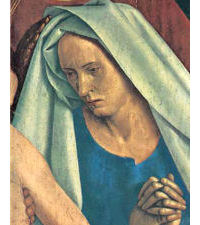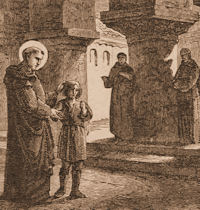
Daily Readings for:September 06, 2014
(Readings on USCCB website)
Collect: God of might, giver of every good gift, put into our hearts the love of your name, so that, by deepening our sense of reverence, and, by your watchful care, keep safe what you have nurtured. Through our Lord Jesus Christ, your Son, who lives and reigns with you in the unity of the Holy Spirit, one God, for ever and ever.
RECIPES
ACTIVITIES
PRAYERS
o September Devotion: Our Lady of Sorrows
· Ordinary Time: September 6th
· Saturday of the Twenty-Second Week of Ordinary Time
Old Calendar: St. Eleutherius, priest (Hist)
Mary suffered because of her intimate union with Christ, on account of our sins, and on behalf of her spiritual children. Devotion to the Mother of Sorrows and the Seven Sorrows of Mary encourages us to flee from sin and inflames our desire to do penance and make reparation so as to console the Hearts of Jesus and Mary.
— The Catholic Faith, John O'Connell
Historically today is the feast of St. Eleutherius, abbot of St. Mark's monastery near Spoleto in the Italian province of Perugia, he was the friend of St. Gregory who mentions him several times in his Dialogues.
St. Eleutherius A wonderful simplicity and spirit of compunction were the distinguishing virtues of this holy sixth century abbot. He was elected to preside Saint Mark’s monastery near Spoleto, and favored by God with the gift of miracles.
A wonderful simplicity and spirit of compunction were the distinguishing virtues of this holy sixth century abbot. He was elected to preside Saint Mark’s monastery near Spoleto, and favored by God with the gift of miracles.
A child who was confided to the monastery, to be educated there after having been delivered by the Abbot from a diabolical possession, appeared to everyone to be entirely exempt from further molestations. And Saint Eleutherius chanced to say one day: “Since the child is among the servants of God, the devil dares not approach him.” These words seemed to savor of vanity, and thereupon the devil again entered into and tormented the child. The Abbot humbly confessed his fault and undertook a fast, in which the entire community joined, until the child was again freed from the tyranny of the fiend.
Saint Gregory the Great, finding himself unable to fast on Holy Saturday on account of extreme weakness, called for this Saint, who was in Rome at the time, to offer up prayers to God for him that he might join the faithful in the solemn practice of that day’s penances. Saint Eleutherius prayed with many tears, and the Pope, when they came out of the church, felt suddenly strengthened and able to accomplish the fast as he desired. The same Pope, remarking that the Abbot was said to have raised a dead man to life, added: “He was so simple a man, one of such great penance, that we must not doubt that Almighty God granted much to his tears and his humility!” After resigning his abbacy, Saint Eleutherius died in Rome in Saint Andrew’s monastery, about the year 585.
—Excerpted from Vie des Saints pour tous les jours de l’année, by Abbé L. Jaud (Mame: Tours, 1950); Little Pictorial Lives of the Saints, a compilation based on Butler’s Lives of the Saints and other sources by John Gilmary Shea (Benziger Brothers: New York, 1894).